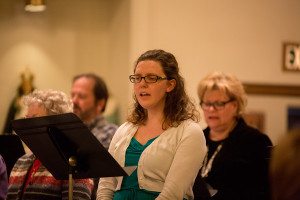I mentioned recently in a previous blog that Sherry Weddell gave a great series of presentations to our clergy for this year’s clergy institute. One of the astounding statistics she provided indicates that many Catholics do not believe it is possible to have a personal relationship with God. This statistic alone can give tremendous guidance to every pastor and parish regarding a key priority in our day-to-day mission. That priority is simple; lead people to Jesus Christ.
Last Sunday’s first reading came from the Prophet Jeremiah, and gives a great starting point for all of God’s people to believe that it IS possible to have a relationship with God. In fact, this is God’s deepest desire for us, to enter into relationship with us!
Before I formed you in the womb I knew you, before you were born I dedicated you, a prophet to the nations I appointed you. (Jeremiah 1: 5)
Similar teachings can be found throughout sacred scripture. The Prophet Isaiah says the same thing in Chapter 44 verse 2. Psalm 139 vs 13 repeats this wisdom. And Psalm 8 takes this knowledge and further develops it into the foundation and basis for the dignity that is due every human person.
We believe God brings every human life into being. We also believe that because God is love, (1 John 4:8) our human dignity is rooted in God’s love for us. St. John further defines love: “In this is love: not that we have loved God, but that he loved us and sent his Son as expiation for our sins.” (1 John 4:10) This divine teaching tells us just how much God desires a relationship of love with each of us. And if this is God’s desire, then clearly, it is not only possible to have a relationship with God, but at the core of every human person is a deep desire to be in this relationship of love with God! For Catholics, and for all Christians, this relationship with God takes place in the person of Jesus Christ.
The Gospels speak of the many human relationships Jesus developed during his earthly life and ministry. He called many people into personal relationship and friendship. He taught of the Father’s love. He healed with the power of Life that was his as the Son of God, and in the same manner healed hearts and consciences with compassion and mercy through the forgiveness of sins. His ultimate gift of healing is the gift of salvation he offers every human person through his death and resurrection.
Through the resurrection, Jesus continues to be present to any and all who choose to believe in him, who welcome him as both the Son of God and as Friend. We need only make the slightest opening in the door of our hearts to Christ by simple acts of faith in him, and he will walk directly into our life. I know how much I need the gift of salvation he brings. I know how much I need his friendship. I am so very grateful for his presence, love and action in my life.
 Sunday’s Psalm response reminds us of a basic result of experiencing this life changing relationship with Jesus. Psalm 71 says that “I will sing of your salvation.” Any of us who have fallen in love know that we cannot wait to tell others of this amazing relationship in our life. We must not remain silent in the reality of the amazing relationship that is ours with Christ. Our lives must take up this song of salvation.
Sunday’s Psalm response reminds us of a basic result of experiencing this life changing relationship with Jesus. Psalm 71 says that “I will sing of your salvation.” Any of us who have fallen in love know that we cannot wait to tell others of this amazing relationship in our life. We must not remain silent in the reality of the amazing relationship that is ours with Christ. Our lives must take up this song of salvation.
There are many ways that we sing of the Lord’s salvation. Yes, we can actually sing, especially at Church. But at the heart of our ‘song’ is our relationship with Jesus. The joy of our heart at the knowledge that we are forgiven our sins and the gates of heaven are open to us will naturally exude joy in our very being, let alone in everything that we do.
In today’s Gospel, we hear Mark’s version of the Gospel we heard from Luke on Sunday. Jesus returns to his home town. Here is another ‘setting’ for us to employ. Can we picture Jesus in our home town? Can I picture Jesus coming to my home?
Because the people that watched Jesus grow up could not believe him to be anything more than ‘the son of Joseph and Mary,’ they lacked the faith required to allow Jesus to work any mighty deeds in their midst. When we keep Jesus at a distance, believing he is a fictitious figure of a man-made bible, or only a great prophet, we fail to open the door of possibility for a life-changing encounter with Christ.
In fact, Jesus has come into the world. Through his resurrection and through the Church, he continues to be present. And Jesus has promised to come again. He is calling. He is waiting. He longs to call each of us his friend, so that ‘his joy may be in you, and your joy may be complete.’ (John 15:11)
+pde
0